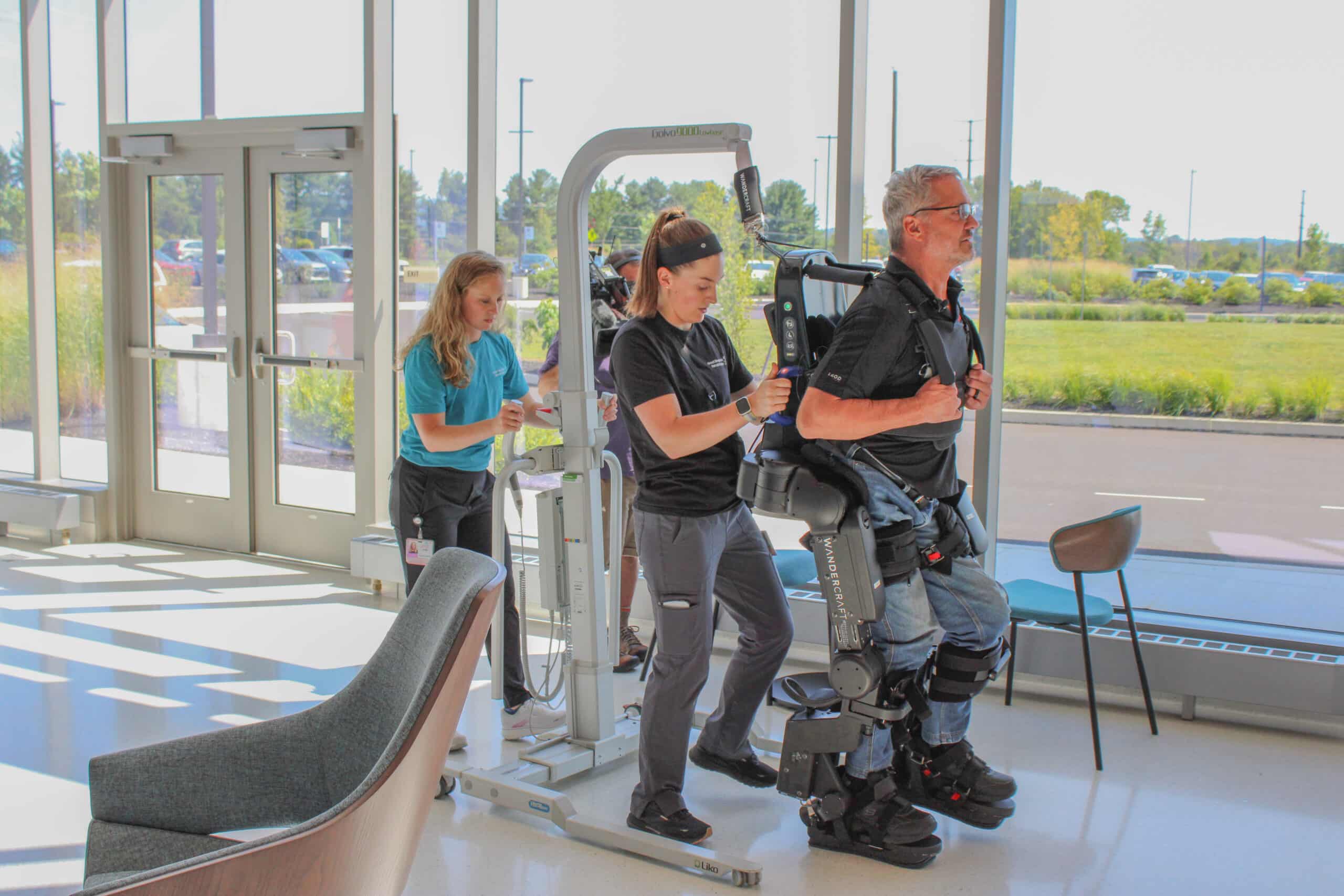Why Choose Us
Learn more about Good Shepherd Rehabilitation Hospital, a destination for recovery for stroke, brain injury, spinal cord injury and complex medical rehabilitation.

CENTER VALLEY, Pa. — Good Shepherd Rehabilitation has welcomed groundbreaking robotic exoskeleton technology that made history and a heartwarming viral moment at the Paris Olympics — becoming the first clinical user in the country to utilize this hands-free device to help people with stroke or spinal cord injury to walk.
Beginning this summer, Good Shepherd’s specially trained clinical teams have trialed the technology — Wandercraft’s Atalante X — with inpatient rehab patients at Good Shepherd Rehabilitation Hospital, 3200 Center Valley Parkway in Center Valley. Later this fall, the exoskeleton will be available for outpatient neurorehabilitation patients at Good Shepherd’s Hyland Center for Health & Technology, 850 S. 5th Street in Allentown.
Hands-free robotic exoskeletons allow patients with severe impairments to stand up and walk under the trained guidance of Good Shepherd therapists. The benefits of hands-free exoskeletons are improved endurance, increased step counts during walking, increased flexibility, the ability to use hands during functional balance activities, and pain and spasticity management.
The Wandercraft technology, available in the U.S., Europe and South America, comes to Good Shepherd courtesy of The Fleming Center for Robotics in Rehabilitation, a forward-thinking hub that identifies and tests robotic and wearable technology to further provide leading-edge rehabilitation care and, ultimately, contribute to the future of rehabilitation. The Fleming Center launched in November 2023 thanks to a major gift from the Fleming Foundation to Good Shepherd.
“We are excited about the potential of this new type of exoskeleton to revolutionize patient care,” said Emily Lyter, PT, DPT, administrative director of Good Shepherd Learns, Creates and Research, the team that oversees The Fleming Center at Good Shepherd. “Without having to use crutches or a walker for balance, Atalante allows a more diverse range of movement patterns we use in our daily lives. Aside from walking, patients can practice activities of daily living, such as reaching for a cup in a cupboard, setting a dinner table or even playing a modified game of pickleball.”
Lyter added: “Through the Fleming Center for Robotics in Rehabilitation and the incredible support of the Fleming Foundation, we’re able to test, trial and adopt new technologies for our patients.”
Kevin Oldt (pictured, above) demonstrated the technology inside Empower+ on Good Shepherd’s Center Valley campus on Aug. 28. Oldt sustained a spinal cord injury in a snowmobiling accident several years ago, leaving him paralyzed.
“It feels really good to stand,” Oldt said with a smile before the assembled crowd.
Wandercraft’s exoskeleton took center stage in Paris earlier this summer when Parathlete Kevin Piette, a former tennis player who sustained a spinal cord injury in an accident 11 years ago, became the first person to carry the Olympic Torch in an exoskeleton.
To learn more, call 1-888-447-3422 (44-REHAB).
Good Shepherd Rehabilitation, an independent, not-for-profit rehabilitation network with 1,300 employees and nearly 30 locations in eight counties of eastern Pennsylvania, is committed to transforming the lives of people of all ages and abilities through curiosity, creativity, expertise and innovation. Headquartered in Allentown, Pennsylvania, Good Shepherd Rehabilitation specializes in treatment of spinal cord injury, brain injury, stroke, major multi-trauma, pulmonary disease, respiratory failure, musculoskeletal/orthopedics and complex pediatric conditions. Good Shepherd Rehabilitation also partners with Penn Medicine to provide rehabilitation and specialty services at more than 30 locations in Philadelphia and New Jersey through Good Shepherd Penn Partners. Info: www.goodshepherdrehab.org.